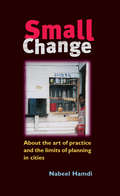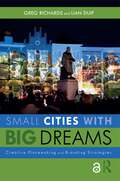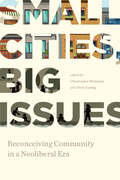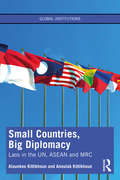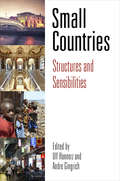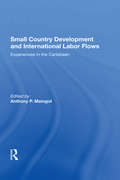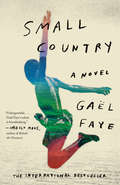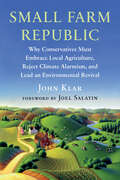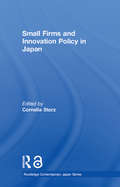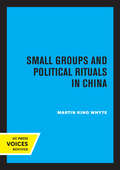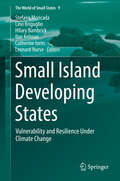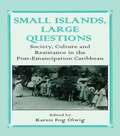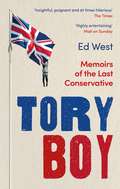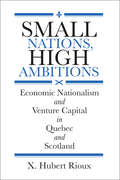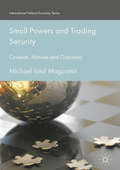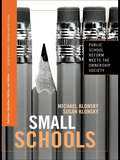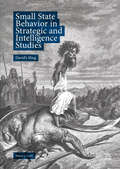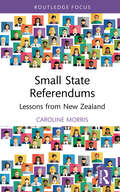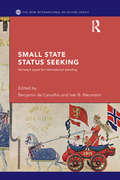- Table View
- List View
Small Change: About the Art of Practice and the Limits of Planning in Cities
by Nabeel HamdiWhat exactly is 'small change'? Build a bus stop in an urban slum and a vibrant community sprouts and grows around it - that is the power of small changes that have huge positive effects. This book is an argument for the wisdom of the street, the ingenuity of the improvisers and the long-term, large-scale effectiveness of immediate, small-scale actions. Written by Nabeel Hamdi, the guru of urban participatory development and the master of the art, Small Change brings over three decades of experience and knowledge to bear on the question 'what is practice'?. Through an easy-to-read narrative style, and using examples from the North and South, the author sheds light on this question and the issues that stem from it - issues relating to political context, the lessons of the 'informal city', and the pursuit of learning that challenges convention. The result is a comprehensive, yet imaginative, guide to the forms of knowledge, competencies and ways of thinking that are fundamental to skilful practice in urban development. This is powerful, informed, critical and inspiring reading for practitioners in the field, students and teachers of urban development, those who manage international aid and everyone looking to build their community.
Small Cities with Big Dreams: Creative Placemaking and Branding Strategies
by Greg Richards Lian DuifHow can small cities make an impact in a globalizing world dominated by ‘world cities’ and urban development strategies aimed at increasing agglomeration? This book addresses the challenges of smaller cities trying to put themselves on the map, attract resources and initiate development. Placemaking has become an important tool for driving urban development that is sensitive to the needs of communities. This volume examines the development of creative placemaking practices that can help to link small cities to external networks, stimulate collaboration and help them make the most of the opportunities presented by the knowledge economy. The authors argue that the adoption of more strategic, holistic placemaking strategies that engage all stakeholders can be a successful alternative to copying bigger places. Drawing on a range of examples from around the world, they analyse small city development strategies and identify key success factors. This book focuses on the case of ‘s-Hertogenbosch, a small Dutch city that used cultural programming to link itself to global networks and stimulate economic, cultural, social and creative development. It advocates the use of cultural programming strategies as a more flexible alternative to traditional top-down planning approaches and as a means of avoiding copying the big city. The Open Access version of this book, available at http://www.taylorfrancis.com, has been made available under a Creative Commons Attribution-Non Commercial-No Derivatives (CC-BY-NC-ND) 4.0 license.
Small Cities, Big Issues: Reconceiving Community in a Neoliberal Era
by Christopher Walmsley Terry KadingSmall Canadian cities confront serious social issues as a result of the neoliberal economic restructuring practiced by both federal and provincial governments since the 1980s. Drastic spending reductions and ongoing restraint in social assistance, income supports, and the provision of affordable housing, combined with the offloading of social responsibilities onto municipalities, has contributed to the generalization of social issues once chiefly associated with Canada’s largest urban centres. As the investigations in this volume illustrate, while some communities responded to these issues with inclusionary and progressive actions others were more exclusionary and reactive—revealing forms of discrimination, exclusion, and “othering” in the implementation of practices and policies. Importantly, however their investigations reveal a broad range of responses to the social issues they face. No matter the process and results of the proposed solutions, what the contributors uncovered were distinctive attributes of the small city as it struggles to confront increasingly complex social issues. If local governments accept a social agenda as part of its responsibilities, the contributors to Small Cities, Big Issues believe that small cities can succeed in reconceiving community based on the ideals of acceptance, accommodation, and inclusion.
Small Cities: Urban Experience Beyond the Metropolis (Questioning Cities)
by David Bell Mark JayneUntil now, much research in the field of urban planning and change has focused on the economic, political, social, cultural and spatial transformations of global cities and larger metropolitan areas. In this topical new volume, David Bell and Mark Jayne redress this balance, focusing on urban change within small cities around the world. Drawing together research from a strong international team of contributors, this four part book is the first systematic overview of small cities. A comprehensive and integrated primer with coverage of all key topics, it takes a multi-disciplinary approach to an important contemporary urban phenomenon. The book addresses: political and economic decision making urban economic development and competitive advantage cultural infrastructure and planning in the regeneration of small cities identities, lifestyles and ways in which different groups interact in small cities. Centering on urban change as opposed to pure ethnographic description, the book’s focus on informed empirical research raises many important issues. Its blend of conceptual chapters and theoretically directed case studies provides an excellent resource for a broad spectrum of undergraduate and postgraduate students, as well as providing a rich resource for academics and researchers.
Small Countries, Big Diplomacy: Laos in the UN, ASEAN and MRC (Global Institutions)
by Anoulak Kittikhoun Alounkeo KittikhounThis book shows how small countries use "big" diplomacy to advance national interests and global agendas – from issues of peace and security (the South China Sea and nuclearization in Korea) and human rights (decolonization) to development (landlocked and least developed countries) and environment (hydropower development). Using the case of Laos, it explores how a small landlocked developing state maneuvered among the big players and championed causes of international concern at three of the world’s important global institutions – the United Nations (UN), the Association of Southeast Asian Nations (ASEAN) and the Mekong River Commission (MRC). Recounting the geographical and historical origins behind Laos’ diplomacy, this book traces the journey of the country, surrounded by its five larger neighbors China, Thailand, Vietnam, Myanmar and Cambodia, and influenced by superpower rivalries, from the Cold War to the post-Cold War eras. The book is written from an integrated perspective of a French-educated Lao diplomat with over 40 years of experience in various senior roles in the Lao government, leading major groups and committees at the UN and ASEAN; and the theoretical knowledge and experience of an American-trained Lao political scientist and international civil servant who has worked for the Lao government and the international secretariats of the UN and MRC. These different perspectives bridge not only the theory-practice divide but also the government insider-outsider schism. The book concludes with "seven rules for small state diplomacy" that should prove useful for diplomats, statespersons, policymakers and international civil servants alike. It will also be of interest to scholars and experts in the fields of international relations and foreign policies of Laos, the Mekong and Asia in general.
Small Countries: Structures and Sensibilities
by Ulf Hannerz Andre GingrichWhat is a small country? Is a country small because of the size of its territory or its population? Can smallness be relative, based on the subjective perception of a country's inhabitants or in comparison with one's neighbors? How does smallness, however it is defined, shape a country and its relations with other countries? Answers to these questions, among others, can be found in Small Countries, the first and only anthropological study of smallness as a defining variable.In terms of population size, some two thirds of the countries of the world can now be considered small countries, and they can be found in all world regions except North America and East Asia. They exhibit great diversity with regard to culture, history, and institutional arrangements, so there can be no model of any "typical" small country. Yet the essays collected by Ulf Hannerz and Andre Gingrich identify a range of family resemblances in such areas as internal connectivity and sensibilities of identity. Contributors describe a number of similar problems with which small countries must cope, on domestic levels as well as in their transnational and global encounters. For some small countries, challenges such as media organization and branding have a negative impact on real or perceived vulnerability, while for others, the same challenges facilitate success stories.Comparative case studies cover a diverse set of regions, including the Caribbean, Middle East, Africa, and Europe, and employ diverse anthropological approaches. Tacit assumptions about scale, identities, and networks in everyday social life are best revealed through close, interpretive effort. At times a sense of shared belonging comes to the fore with particular events, such as a national crisis or an unexpected success in international sports, offering scope for situational analyses. In showing how small countries confront globalization, Small Countries reveals how the sense of scale intensifies when the world as a whole shrinks.Contributors: Regina F. Bendix, Aleksandar Bošković, Virginia R. Dominguez, Thomas Hylland Eriksen, Andre Gingrich, Beng-Lan Goh, Ulf Hannerz, Sulayman N. Khalaf, Eva-Maria Knoll, Jacqueline Knörr, Orvar Löfgren, João de Pina-Cabral, Don Robotham, Cris Shore, Richard Wilk, Helena Wulff.
Small Country Development And International Labor Flows: Experiences In The Caribbean
by Anthony MaingotThis book examines policies that nations of emigration and immigration can use to maximize the flow of resources from the emigrants to the home country. It explores interaction of factors such as migration, trade and foreign investment on local and economic development in Mexico and the Caribbean.
Small Country: A Novel
by Gaël FayeAlready an international sensation and prize-winning bestseller in France, an evocative coming-of-age story of a young boy, a lost childhood and a shattered homeland.‘I was born with this story. It ran in my blood. I belonged to it.’ Burundi, 1992. For ten-year-old Gabriel, life in his comfortable expatriate neighborhood of Bujumbura with his French father, Rwandan mother and little sister Ana, is something close to paradise. These are carefree days of laughter and adventure – sneaking Supermatch cigarettes and gorging on stolen mangoes – as he and his mischievous gang of friends transform their tiny cul-de-sac into their kingdom. But dark clouds are gathering over this small country, and soon their peaceful existence will shatter when Burundi, and neighboring Rwanda, are brutally hit by civil war and genocide. A novel of extraordinary power and beauty, Small Country describes an end of innocence as seen through the eyes of a child caught in the maelstrom of history. Shot through with shadows and light, tragedy and humor, it is a stirring tribute not only to a dark chapter in Africa’s past, but also to the bright days that preceded it.
Small Farm Republic: Why Conservatives Must Embrace Local Agriculture, Reject Climate Alarmism, and Lead an Environmental Revival
by John Klar&“I have read at least 20 books a year for the past 25 years and Small Farm Republic is absolutely one of the very best that I have ever read. . . A must-read not only for those involved in all facets of agriculture but policy makers and consumers as well.&”—Gabe Brown, regenerative rancher, author of Dirt to SoilFrom farmer, lawyer, and political activist John Klar comes a bold, solutions-based plan for Conservatives that gets beyond the fatuous pipe dreams and social-justice platitudes of the dominant, Liberal &“Green&” agenda—offering a healthy way forward for everyone.While many on the Left have taken up the mantle of creating a &“green&” future through climate alarmism, spurious new energy sources, and technocratic control, many on the Right continue to deny imminent environmental threats while pushing for unbridled deregulation of our most destructive industrial forces. Neither approach promises a bright future.In a time of soil degradation, runaway pollution, food insecurity, and declining human health, the stakes couldn&’t be higher, and yet the dominant political voices too often overlook the last best hope for our planet—supporting small, regenerative farmers. In fact, politicians on all sides continue to sell out the interests of small farmers to the devastating power of Big Ag and failed &“renewable energy&” incentives. It&’s time for a new vision. It&’s time for bold new agriculture policies that restore both ecosystems and rural communities.In Small Farm Republic, John Klar, an agrarian conservative in the mold of Wendell Berry and Joel Salatin, offers an alternative that puts small farmers, regenerative agriculture, and personal liberty at the center of an environmental revival—a message that everyone on the political spectrum needs to hear.
Small Firms and Innovation Policy in Japan (Routledge Contemporary Japan Series)
by Cornelia StorzThis new book discusses the extent to which the Japanese economy encourages entrepreneurship and innovation. Although Japan has a strong reputation as an innovator, some people argue that this reputation is misplaced. Contrary to earlier expectations, the USA rather than Japan emerged as the leader in the biotech industries in the 1990s, and also many small firms in Japan supply only a few – or just one – other company, thereby limiting their view of the marketplace and the commercial opportunities within it. Despite the increase of international patents, international scientific citations and a positive technology trade balance, the Japanese innovation system is weak in giving birth to radical innovations. The book explores fully these issues, making comparisons with other countries where appropriate. It concludes that the Japanese innovation system has both advantages and disadvantages and contributes to a better understanding of how policy changes take place.
Small Groups and Political Rituals in China
by Martin King WhyteThis title is part of UC Press's Voices Revived program, which commemorates University of California Press’s mission to seek out and cultivate the brightest minds and give them voice, reach, and impact. Drawing on a backlist dating to 1893, Voices Revived makes high-quality, peer-reviewed scholarship accessible once again using print-on-demand technology. This title was originally published in 1974.
Small Is Still Beautiful
by Joseph PearceA third of a century ago, E. F. Schumacher rang out a timely warning against the idolatry of giantism with his book Small Is Beautiful. Since then, millions of copies of Schumacher's work have been sold in dozens of different languages; few books before or since have spoken so profoundly to urgent economic and social considerations. Schumacher, a highly respected economist and adviser to third-world governments, broke ranks with the accepted wisdom of his peers to warn of impending calamity if rampant consumerism, technological dynamism, and economic expansionism were not checked by human and environmental considerations. Humanity was lurching blindly in the wrong direction, argued Schumacher. Its obsessive pursuit of wealth would not, as so many believed, ultimately lead to utopia but more probably to catastrophe.Schumacher's greatest achievement was the fusion of ancient wisdom and modern economics in a language that encapsulated contemporary doubts and fears about the industrialized world. The wisdom of the ages, the perennial truths that have guided humanity throughout its history, serves as a constant reminder to each new generation of the limits to human ambition. But if this wisdom is a warning, it is also a battle cry. Schumacher saw that we needed to relearn the beauty of smallness, of human-scale technology and environments. It was no coincidence that his book was subtitled Economics as if People Mattered.Joseph Pearce revisits Schumacher's arguments and examines the multifarious ways in which Schumacher's ideas themselves still matter. Faced though we are with fearful new technological possibilities and the continued centralization of power in large governmental and economic structures, there is still the possibility of pursuing a saner and more sustainable vision for humanity. Bigger is not always best, Pearce reminds us, and small is still beautiful.
Small Island Developing States: Vulnerability and Resilience Under Climate Change (The World of Small States #9)
by Ilan Kelman Lino Briguglio Stefano Moncada Hilary Bambrick Catherine Iorns Leonard NurseThis book explores how vulnerable and resilient communities from SIDS are affected by climate change; proposes and, where possible, evaluates adaptation activities; identifies factors capable of enhancing or inhibiting SIDS people’s long-term ability to deal with climate change; and critiques the discourses, vocabularies, and constructions around SIDS dealing with climate change. The contributions, written by well-established scholars, as well as emerging authors and practitioners, in the field, include conceptual papers, coherent methodological approaches, and case studies from the communities based in the Caribbean Sea and the Indian, Atlantic, and Pacific Oceans. In their introduction, the editors contextualise the book within the current literature. They emphasise the importance of stronger links between climate change science and policy in SIDS, both to increase effectiveness of policy and also boost scholarly enquiry in the context of whose communities are often excluded by mainstream research. This book is timely and appropriate, given the recent commission by the Intergovernmental Panel on Climate Change (IPCC) of a Special Report that aims at addressing vulnerabilities, “especially in islands and coastal areas, as well as the adaptation and policy development opportunities” following the Paris Agreement. Coupled with this, there is also the need to support the policy community with further scientific evidence on climate change–related issues in SIDS, accompanying the first years of implementation of the United Nations Sustainable Development Goals.
Small Islands in Maritime Disputes: Greek Turkish Energy Geo-politics
by Ozay Mehmet Vedat YorucuThis book explores the delicate interconnections between law and economics, especially as regards island entitlements under international maritime law. This is an area in the literature generally overlooked because maritime law has been the domain of legal experts. Maritime boundary disputes are over resources, a vitally important economic subject. Yet, the economics of maritime law has been ignored. Lawyers and legal experts have dominated the field, to the alarming degree of causing needless international conflicts. Our monograph addresses this serious neglect. The methodology would be rational behavior model, one specifically formulated to make the case that dialog and negotiation between these countries is the rational choice leading to win-win outcome in the Aegean and Eastern Mediterranean territorial waters. Public and private sector actors identified as key decision-makers in all phases of hydrocarbon development and monetization, within an overall win-win framework.
Small Islands, Large Questions: Society, Culture and Resistance in the Post-Emancipation Caribbean
by Karen Fog OlwigThis book focuses on the post-emancipation period in the Caribbean and how local societies dealt with the new socio-economic conditions. Scholars from Jamaica, the Virgin Islands, England, Denmark and The Netherlands link this era with the contemporary Caribbean.
Small Men on the Wrong Side of History: The Decline, Fall and Unlikely Return of Conservatism
by Ed West'An entertaining, wide-ranging defence and explanation of the conservative way of seeing the world . . . suffused with generosity and wit' Catholic Herald Brought up by eccentric intellectuals, Ed West experienced what he believed was a fairly normal childhood of political pamphlets as bedtime reading, family holidays to East Germany and a father who was one political step away from advocating the return of serfdom. In his mid-twenties, West found himself embracing a mindset usually acquired alongside a realisation that all music post-1955 is garbage, agreeing with everything said in the Telegraph and all the other bad things people get in middle age. This is his journey to becoming a real-life Tory boy.Forgoing the typically tedious and shouty tone of the Right, West provides that rare gem of a conservative book - one that people of any political alignment can read, if only to laugh at West's gallows humour and dry wit. Crammed with self-deprecating anecdotes and enlightening political insights, Tory Boy discloses a life shaped by politics and the realisation that perhaps this obsession does more harm than good. 'Anyone - liberal, conservative, whatever - would enjoy [this book]. It is full of the most fascinating facts, all mixed in with Ed's inimitable displays of self-mockery' Tom Holland 'A self-deprecating and often hilarious memoir of a born conservative watching the world go wrong. Sprinkled with gallows humour, like a political version of Nick Hornby's Fever Pitch' The Critic
Small Men on the Wrong Side of History: The Decline, Fall and Unlikely Return of Conservatism
by Ed West'An entertaining, wide-ranging defence and explanation of the conservative way of seeing the world . . . suffused with generosity and wit' Catholic HeraldBrought up by eccentric intellectuals, Ed West experienced what he believed was a fairly normal childhood of political pamphlets as bedtime reading, family holidays to East Germany and a father who was one political step away from advocating the return of serfdom. In his mid-twenties, West found himself embracing a mindset usually acquired alongside a realisation that all music post-1955 is garbage, agreeing with everything said in the Telegraph and all the other bad things people get in middle age. This is his journey to becoming a real-life Tory boy.Forgoing the typically tedious and shouty tone of the Right, West provides that rare gem of a conservative book - one that people of any political alignment can read, if only to laugh at West's gallows humour and dry wit. Crammed with self-deprecating anecdotes and enlightening political insights, Small Men on the Wrong Side of History discloses a life shaped by politics and the realisation that perhaps this obsession does more harm than good. 'Anyone - liberal, conservative, whatever - would enjoy [this book]. It is full of the most fascinating facts, all mixed in with Ed's inimitable displays of self-mockery' Tom Holland 'A self-deprecating and often hilarious memoir of a born conservative watching the world go wrong. Sprinkled with gallows humour, like a political version of Nick Hornby's Fever Pitch' The Critic
Small Nations, High Ambitions: Economic Nationalism and Venture Capital in Quebec and Scotland (Studies in Comparative Political Economy and Public Policy)
by X. Hubert RiouxGiven the importance that entrepreneurship and start-up businesses in technology-intensive sectors like life sciences, renewable energy, artificial intelligence, financial technologies, software and others have come to assume in economic development, the access of entrepreneurs to appropriate levels of finance has become a major focus of policymakers in recent decades. Yet, this prominence has led to a variety of policy models across countries and even within countries, as different levels of government have adapted to new challenges by refining or transforming pre-existing institutions and crafting new policy tools. Small Nations, High Ambitions investigates the roots of such policy diversity at the “subnational” level, offering in-depth accounts of the evolution of Quebec’s and Scotland’s policy strategies in the entrepreneurial finance sector and venture capital more specifically. As compared to other regions and provinces in the United Kingdom and Canada, Quebec and Scottish venture capital ecosystems rely on a high degree of state intervention, either direct (through public investment funds) or indirect (through government-backed, hybrid, or tax-advantaged funds). These two regions can thus be described as “sponsor states,” heavily involved in the strategic backing of innovative businesses. Whereas most of the literature on venture capital has focused on economic variables to explain variations in policy models, this book seeks to explain policy divergence in Quebec and Scotland through political and ideological lenses. Its main argument is that the development of venture capital ecosystems in these regions was underpinned by Québécois and Scottish nationalisms, which induced preferences for policy asymmetry and state intervention.
Small Powers and Trading Security
by Michael Intal MagcamitThis book examines why and how small powers link their security interests and trade agendas, and how security threats influence the facilitation and outcome of their trade activities. In doing so, it analyses the increasingly complex connections between trade and security, demonstrating how these linkages affect the overall security of four small but important states in East Asia. Focusing on the role of high levels of internal and external insecurities, marginal geo-economic size and peripheral geopolitical position, and multidimensional and multidirectional security contexts and threats, the author concludes that for every security enhancement that a linkage creates a consequent security risk is generated. In other words, Taiwan, Singapore, Malaysia, and the Philippines are effectively trading their security. This innovative book will appeal to political scientists, economists, and security and trade experts.
Small Scale Sport Tourism Events and Local Sustainable Development: A Cross-National Comparative Perspective (Sports Economics, Management and Policy #18)
by Ricardo Melo Claude Sobry Derek Van RheenenThis book outlines the impacts of small scale sport tourism events on local sustainable development in different countries. Using half marathons organized in small and medium sized cities as an example, the chapters are robust case studies, applying a unified methodology in order to provide a clear overview of the sport tourism system in each country. The book begins with a description of the methodologies used and an overview of the countries studied. The country chapters focus on several dimensions of sport tourism in each city, including but not limited to the history of past sport tourism events in the municipality, the characteristics of the city hosting the event, the demographic profile of participants in the event, and the quantifiable economic, environmental, and sociocultural impacts of the event. Each chapter concludes with analysis and policy recommendations for holding future events that contribute to local sustainable development. The book concludes by summarizing and comparing the main results across different countries, and presenting main conclusions and overarching recommendations.Written by international experts in sports tourism, this book is geared towards academic researchers and students, interested in sport tourism, sports economics, management, and sustainable development, as well as policy makers and professionals tasked with bringing such events to their cities.
Small Schools: Public School Reform Meets the Ownership Society (Positions: Education, Politics, and Culture)
by Michael Klonsky Susan KlonskyWhen education activists in New York, Chicago, and other urban school districts in the 1980s began the small-schools movement, they envisioned a new kind of public school system that was fair and equitable and that encouraged new relationships between teachers and students. When that movement for school reform ran head-on into the neo-conservative takeover of the Department of Education and its No Child Left Behind strategy for school change, a new model of federal power bent on the erosion of public space and the privatization of public schooling emerged. Michael and Susan Klonsky, educators who were among the early leaders of the small-schools movement, tell the story of how a once-promising model of creating new small and charter schools has been used by the neocons to reproduce many of the old inequities. Small Schools is the engaging story of what happens when the small-schools movement meets the Ownership Society.
Small Ships in Theater Security Cooperation
by Robert W. Button Michele A. Poole Irv Blickstein Laurence Smallman David NewtonThe authors evaluate the use of small ships in theater security cooperation (TSC). They provide the U.S. Navy with a concept of operation for small ships in TSC, necessary small ship characteristics, a survey of suitable ships, and recommendations for increasing the effectiveness of TSC operations conducted with a small vessel. The report concludes that, with a mothership, the PC-1 Cyclone Class would be fully capable for use in TSC.
Small State Behavior in Strategic and Intelligence Studies
by Patrick C. CoatySmall state behavior has been largely ignored by academics in both international relations and strategic/intelligence studies. Yet, when we analyze the root causes of war, insurrections, rebellions, revolutions and general sociological human behavior, it is the small state actors that are usually at the epicenter of the tumultuous event. It is the spark from inside the small state actor – whether it is Serbia, Czechoslovakia, Cuba, Vietnam, Kuwait, Iraq or Syria -- that seemingly leads to internal and external confrontations that inevitably involve much larger states. To date, a book length analysis like this has yet to be published. The scope of this project is to provide an analysis of a sampling of small state’s behavior in order to build on a unifying theory of security/intelligence studies. This analysis will necessarily survey the breadth of security/intelligence studies from Clausewitz to current applicable United Nations’ Resolutions and international law. In short, if we can understand how political structures affect the behavior of small states, it will be a major contribution to the field of security/intelligence studies enabling policy makers, scholars and the general public to separate fact from myth in analyzing the strategic policies of small states.
Small State Referendums: Lessons from New Zealand
by Caroline MorrisThis book explores the unusual and unique experience of direct democracy in the small state of New Zealand, where referendums have been a persistent feature of the political landscape for over a century. Referendums have been the site of renewed interest from scholars, seeking to respond to what they term the "democratic deficit" in otherwise stable and functional Western democracies. They have also been at the heart of many divisive and important political and social moments in recent history, from the UK’s Brexit referendum in 2016 to the disputed legitimacy of the 2022 referendums in Russian-occupied Ukraine. This book fills an important gap in the literature through an extended study of the law and practice of referendums in the small Commonwealth state of New Zealand. It also expands the field of small state democracy studies by applying the insights of this field to the direct democracy experience of a small state. With the inclusion of comprehensive tables of referendums and legislative materials, this book will be of interest to scholars of direct democracy and small states, politicians, legislators and policy makers, and all those with a desire to do democracy better.
Small State Status Seeking: Norway's Quest for International Standing (New International Relations)
by Iver B Neumann Benjamin De CarvalhoStatus-seeking is an important aspect of the foreign policies of a number of small states, but one that has been rarely studied. This book aims to contribute to our understanding not only of status-seeking, by coming at that question from a new angle, that of a small state, but also to our understanding of foreign policy, by discussing the importance of status for foreign policy overall. If status is a hierarchy, then it is important to focus not just on the highest-ranking powers, but also those at lower levels. As the distribution of power is becoming more diffuse, the role of small and medium powers becomes more significant than it was during the Cold war. The book chapters go beyond familiar explications of "soft power" or conflict resolution to highlight new aspects of Norway’s foreign policy, including contributions to national defense, global warming, and management of Arctic resources. This book will be of interest to students and scholars in areas including US Foreign Policy, International Relations and European Politics.
